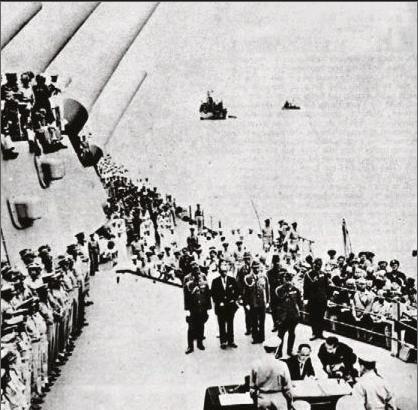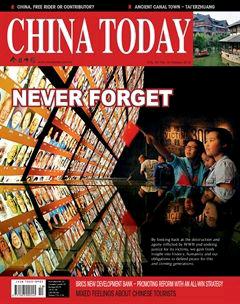Never Forget
By+staff+reporter+JIAO+FENG

THE Second World War ended almost 70 years ago. People who witnessed the war first-hand are now in their twilight years, many have passed away. Yet, the war remains vivid in the worlds collective memory. It was a period when “disaster” ruled and, therefore, can never be forgotten.
On September 2, 1945, a representative of Japan offi cially signed the Instrument of Surrender on the deck of the USS Missouri, marking the fi nal victory of the worlds war against fascism.
During this life-and-death war that reshaped the world, more than 60 countries and regions and over two billion people were involved; it is estimated that around 55 million to 70 million soldiers and civilians lost their lives. China was the main battlefi eld in the East. The nation fought the Japanese invading army, but paid for its victory with 35 million casualties.
History runs the danger of being confined to textbooks, closed and shelved. If a country or people were to forget their own history, it could be regarded as a betrayal of the past and of oneself.“Museums and memorial halls are the second classroom where the public can understand history,” said Li Zongyuan, deputy curator of the Museum of the War of Chinese Peoples Resistance Against Japanese Aggression.
To maintain historical reality and advocate world peace, the museum has proposed the creation of a WWII museum alliance. “During years of exchange with WWII museums and memorial halls in other countries, we have come to realize that safeguarding historical reality is not the responsibility of one country or one museum; it should be the common goal of all people around the world who can put that spell of history in perspective,” said Li Zongyuan.“Therefore, we suggest WWII museums and memorial halls worldwide form an organization to launch exchange and cooperation, jointly maintain historical reality, and spread the concept of peace.”
In 2013, the museum held an exhibition at the Auschwitz-Birkenau State Museum in Poland. It invited a number of representatives from other war museums around the world, who unanimously agreed on the proposal to build an alliance of WWII museums. Invitations were sent to counterparts in Russia, Poland, Singapore, Korea, Japan, and the U.S. to consult on opinions and hopes for the collaboration. It is anticipated that the alliance will be offi cially inaugurated in 2015, the 70th anniversary of victory over fascism.
Great Contribution
Chinas Anti-Japanese War was not an isolated incident but an important component of the wider worlds anti-fascist war, since China served as the main battlefield of the war in the East. “This orientation is accurate,” said Li Zongyuan. “The Chinese peoples resistance consumed and weakened the strength of Japanese militarism, and dealt a lasting blow, especially after the outbreak of the Pacific War. Because most of the Japanese army were caught up in the China battlefield, military pressure on the Soviet Union, the U.S and Britain was lessened, which strategically and effectively bolstered the war against fascism.”
“Chinas resistance against Japan is one of the great untold stories of World War II. Though China was the fi rst Allied power to f ight the Axis, it has received far less credit for its role in the Pacifi c arena than the United States, Britain or even the Soviet Union, which joined the war in Asia only in August 1945. The Chinese contribution was pushed aside soon after the conflict, as an inconvenient story in the neat ideological narrative of the Cold War,” said Oxford University professor Rana Mitter in his article “The Worlds Wartime Debt to China” published in The New York Times on October 18, 2013. He expounds on this in his new book Forgotten Ally, explaining that WWII did not start on the European plain, but broke out from “accidental discharge” in China, namely, the Marco Polo Bridge Incident(also known as the Lugou Bridge Incident or the July 7 Incident).
According to Mitter, increasingly more experts are starting to recognize Chinas positive role in WWII.
Based on historical materials, during WWII, Chinas battlefield contained some one million Japanese army main forces. On September 9, 1945, China accepted the surrender of 1.28 million Japanese soldiers. The Chinese people made a tremendous national sacrifice for this war, with more than 35 million total casualties of military and civilians, and direct and indirect economic losses over US $100 billion and $500 billion respectively.
Learn from the Past
As a Chinese proverb goes,“Past experience, if not forgotten, is a guide for the future.” On July 7, 2014, Chinese President Xi Jinping underscored the intractability of history as the nation commemorated the start of the War of Resistance against Japanese Aggression 77 years ago. Xi said the gathering should serve to recall history, commemorate martyrs, cherish peace and sound a warning for the future. China will unswervingly pursue the road of peaceful development and adamantly maintain world peace.
Since the September 18 Incident in 1931, Japanese militarism had gradually encroached upon Northeast China. On the evening of July 7, 1937, a Japanese detachment carried out military ma- neuvers north of Lugou Bridge. On the premise that a soldier was missing, Japanese troops requested a search of the county town of Wanping. The Chinese garrison there refused this unreasonable demand. The next morning, the Japanese launched a fierce attack and soldiers of the Chinese army courageously resisted. Then confl icts quickly escalated and tensions between the two sides mounted. The July 7 Incident marked the beginning of Japans all-out war of aggression against China as well as the start of the Chinas eight-year-long nationwide War of Resistance against Japan. The Japanese military committed heinous crimes: They massacred civilians and disarmed soldiers; they used prisoners of war as targets for bayonet drills and forced women into sexual slavery; they arrested civilians to engage in heavy forced labor in Japan and deployed biological and chemical weapons. In violating International Law, the Japanese inflicted unspeakable suffering on people from China, North Korea, and South Korea –but they also caused endless trauma to innocent Japanese people.
After WWII, Japan, as the aggres- sor and vanquished nation, should have demonstrated remorse, exercised introspection and strived to maintain the hard-won peace. Unfortunately, Japans right-wing forces have persistently disregarded historical facts and the millions of innocent victims of this war, denied, distorted or even beautified its aggressive war, and intimated moves to regain the right of collective self-defense, so making a peaceful constitution impracticable. This attitude is bound to encounter strong condemnation and opposition from people in the affected countries including Japan, as well as peace-loving people all over the world.
“Peace is the common ideal of people worldwide. Japanese outrages in WWII threatened that ideal. In fighting against atrocities and aggression, peace-loving people endeavored to safeguard world peace and human dignity,”said Li. “Japans act of denying, distorting or even beautifying its aggressive war is like a contamination of the victims souls and an insult to the living, which deserves condemnation and criticism.”
Remembrance is not about sowing seeds of revenge or nationalism. “What nationalism advocates is exclusivism and the narrowest form of patriotism. Maintaining a realistic historical perspective, human peace and dignity is central to remembrance,” said Li.
In February 2014, the Standing Committee of the National Peoples Congress, Chinas top legislature, ratified September 3 to mark Chinas victory over Japan, and December 13 as the national memorial day to commemorate victims of the Nanjing Massacre. “History is the best textbook, as well as the best dose of sobriety,” Xi said, adding that Chinese people, who remember the torment of war, have always been in pursuit of peace.
Remembering the past is not about prolonging hostility. Only by commemorating the past can people draw historical lessons, cherish the hard-won peace and create a brighter outlook for the future.

